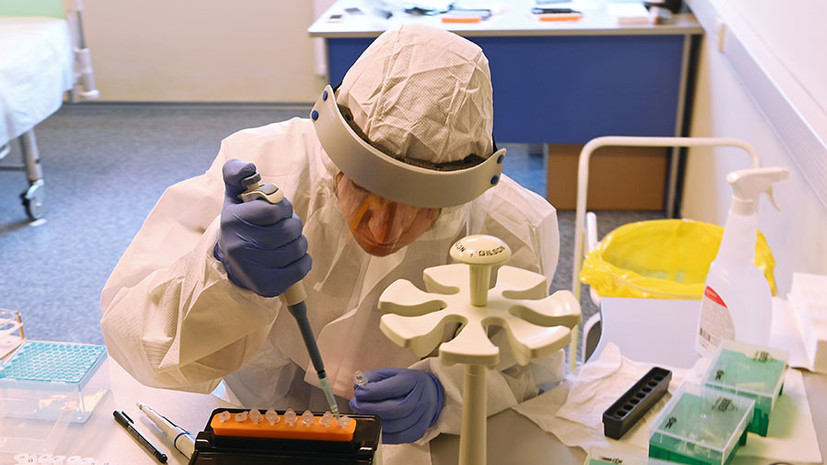Over the past day, 9,289 new cases of coronavirus were detected in Russia.
During this period, 9250 people fully recovered.
From complications that developed against the background of COVID-19 and concomitant diseases, 401 people died in 24 hours.
Since the beginning of the pandemic, 5,053,748 cases of coronavirus have been identified in the country.
Over the entire observation period, 120 807 deaths were recorded, 4 670 484 people recovered.
262,457 cases remain active.
According to Rospotrebnadzor, over the entire period, over 137.5 million laboratory tests for a new type of coronavirus infection were carried out, including 369 thousand in the last day.
526,547 people remain under medical supervision.
Continuation of work on Russian vaccines
Earlier, the head of the Russian Ministry of Health, Mikhail Murashko, spoke about plans to test the Sputnik V COVID-19 vaccine among children.
According to him, at the moment, "the protocols have already been developed by specialists."
"Clinical trials of the vaccine in children - it will probably take up to four months, for pregnant women, I think, earlier," RIA Novosti Murashko quotes.
The minister also said that data on the safety of the Sputnik V coronavirus vaccine for pregnant women had been received.
Murashko added that changes are currently being made to the instructions for using the drug for this category of patients.
In addition, the minister spoke about the scope of the Sputnik Light single-component vaccine against coronavirus.
As a reminder, this drug was registered on May 6.
According to the developers' estimates, the effectiveness of the vaccine is 79.4% from the 28th day after immunization.
“In Russia, it (the drug -
RT
) will be used.
Mostly, we will use it for people under 60, ”RIA Novosti quoted him as saying.
Meanwhile, the Russian Academy of Sciences issued an appeal to the Russians, which speaks of the urgent need to get vaccinated against COVID-19.
The organization stressed that claims about the ability of vaccinations to cause any harm to human health and the long-term consequences of vaccination have no scientific basis.
As recalled in the Russian Academy of Sciences, the history of various epidemics in the past shows that vaccination is the most correct scientifically grounded answer of an educated person to the ongoing pandemic.
Meanwhile, in Russia, within a few months, all opportunities were created to get everyone vaccinated against coronavirus infection, the Russian Academy of Sciences stressed.
“The Presidium of the Russian Academy of Sciences calls on the residents of Russia not to postpone vaccination, to get vaccinated in the next month.
From the point of view of science, this is the most adequate response to the challenge of a pandemic.
This is the only way we can return to normal life, ”the statement reads.
Coronavirus in the world and new strains
According to the World Health Organization (WHO), there have been 168,599,045 confirmed cases of coronavirus worldwide since the start of the pandemic.
The number of deaths reached 3,507,477. According to the American Johns Hopkins University, which also counts COVID-19 cases in the world, the total number of detected cases of coronavirus is 169,545,285, and the number of deaths reached 3,525,030.
Meanwhile, scientists in Vietnam said they have identified a new variant of SARS-CoV-2, which is a hybrid of British and Indian strains.
According to Vietnamese experts, it is more infectious and easily transmitted by air.
Also on russian.rt.com No re-disease with one COVID-19 strain has been detected in Russia
According to the Minister of Health of the Republic, Nguyen Thanh Long, a new variant of the virus led to a massive infection of COVID-19 in a number of northern regions of the country and marked the beginning of the fourth wave of coronavirus, which began in Vietnam since April 27.
According to the WHO, there are 6,356 cases of coronavirus in the country.
Over the previous day, 245 new cases of the disease were detected in Vietnam.
Meanwhile, WHO announced the continuation of work to determine the origin of the coronavirus.
At the same time, Michael Ryan, the director of the WHO emergency program, urged not to wait for quick results.
“We continue to work with an international team of experts, review their recommendations, and also work with member countries to determine the next stages of research.
It will take time and a number of missions to establish the origin of the new coronavirus, if at all possible, ”TASS quoted him as saying.
At the same time, Ryan called for "separating politics from science" and carrying out this work in a "positive atmosphere" based on solidarity.

